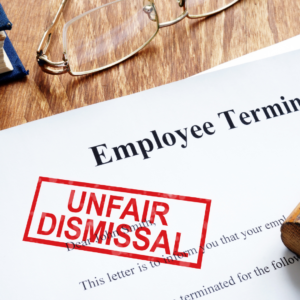By Amanda Hamilton, NALP

THERE are many reasons why someone might take their employer to a tribunal. Poor pay, unfair dismissal, discrimination and sexual harassment are among the most common.
If you have been working for an employer for two years, and you’ve been dismissed due to, or during, maternity, paternity or adoption leave, or jury service, or you have been forced to retire, this may be deemed unfair dismissal.
Alternatively, if you feel you have been forced to leave because staying in your job is untenable, then this may be construed as constructive dismissal.
In all the above cases, you are entitled to bring an action against your employer through an employment tribunal.
These are independent judicial bodies that are less formal than courts and were created to be more accessible and less daunting for individuals to resolve issues and disputes.
There are eight main Tribunals in England and Wales: Employment tribunals, Immigration Services Tribunal, Lands Tribunal, Social Security & Child Support Commissioners, The Criminal Injuries and Compensation Appeals Panel, The Mental Health Review Tribunal, Pensions Appeal Tribunals and Asylum & Immigration Tribunal.
Traditionally, tribunals were created to be less costly and a more speedy form of resolving disputes. Taking your employer to a tribunal doesn’t need to involve the services or the costs of a solicitor.
There is plenty of information and guidance online, and virtually all the work can be done electronically.
Start by filling in an ET1 form which can be found on Gov.UK. This is a very important form in which you can make a statement about your claim.
If the case does go to a hearing, this is the first document the tribunal will read so it is essential all the facts are clear and focused on your claim.
As employment law is so complex and the ET1 form is crucial to your claim it is a good idea to have some help in preparing your case.
Since July 2017 there is no fee to pay to make your claim at a tribunal, although there is a small chance you could be asked to pay your employer’s cost of going to court if you lose.
However, if you have followed the process correctly it is unlikely you will have to pay costs so preparing your claim carefully should be a priority.
This is where the help of a paralegal, who can offer the same advice as a solicitor but generally charges considerably less, might be worth considering.
A paralegal will have completed legal training and have experience but is not qualified as a solicitor.
When filling in the ET1 form give a clear but concise account of what the claim is about and keep to the point.
You should include all the key events but avoid going into an enormous amount of detail and number each paragraph for easy reference.
When complete, be clear whether it is you or your advisor who is submitting the form to the Central Office of Employment Tribunals as there are strict time limits.
In most cases a claim has to be submitted three months, less a day, from the date of dismissal and claims that arrive late won’t be considered.
When the ET1 form has been received by the tribunal, a copy of it will be sent to the employer who will then send their response to it on an ET3 form which you should receive back within around four weeks.
If at all possible it is really best to try and solve the problem through conciliation and your first port of call should be the Advisory, Conciliation and Arbitration Service (ACAS).
In the event the employer refuses to settle and you find you are facing a tribunal you need to decide whether you are going to represent yourself or engage a representative.
If you have used the services of a paralegal they will do all the preparation for you and will act as your representative at the tribunal.
There is nothing to worry about if you do have to attend a tribunal, they are more relaxed than courts.
Make sure you arrive in plenty of time, at least half-an-hour in advance.
On arrival, check in with the clerk who will ask if you have a representative and for any documents, witness statements and a certificate from ACAS to prove you have spoken to them.
If you are not being represented you should have any notes you have made in the workplace, emails, letters or text messages between yourself and your boss along with any copies of witness statements supporting your case.
You will be asked to wait in a room until you are called and it is at this point a representative from the employer could approach you and try to negotiate a last-minute settlement.
Don’t be intimidated by this and do not to let them pressure you into withdrawing your case or to settle if you don’t feel the offer is good enough.
Once inside the tribunal there will be a chairperson who will be legally qualified with experience in this area of law, together with two non-legally qualified individuals.
One may be an experienced employer or human resource expert and the other could be a trade union representative to give a perspective for the employee.
Remember it is a public hearing so there will be other people there. You can also bring along friends and family for support.
You should dress smartly, avoiding trainers and jeans. Switch off your mobile phone and avoid chewing gum. Tell the truth, if you are found to have given false information it may go against you. And behave reasonably at all times.
Although the process of a tribunal case is very straight-forward and quite similar to a hearing in court, the testimony is not given on oath. That means that you are not asked to make an affirmation tell the truth under a penalty of perjury (as you would do in court).
The employee bringing the action sits on the right facing the Tribunal panel and the employer on the left.
The case starts with the employee stating their case and giving evidence and then the employer is asked to respond.
Usually, tribunal decisions are given quite quickly — sometimes on the same day or within a few days or weeks of the hearing.
If you win, then the tribunal will indicate what steps can be taken to compensate you and give a time stipulation. If this is not adhered to, then enforcement proceedings can be taken.
If you lose your case, you have 14 days to request that the tribunal re-considers its decision.
If you are still unhappy with the decision, fill in a Notice of Appeal form, available on Gov.UK and send it to the Employment Appeal Tribunal (EAT) either by email or post.
There is no fee to appeal but it needs to be done within 42 days from the date of the decision or the date the reasons for refusal were sent and it needs to arrive by 4pm on the final day.
A decision will then be made on whether the appeal can go ahead and if so, you will be asked to attend a hearing.
If you are told you are not eligible to appeal you will be sent a letter explaining why with details of whether you can appeal further.
Although a tribunal is a reasonably straight forward process, unless you have experience of speaking in public and a good knowledge of the law in this subject, it can be a daunting task to do it all yourself.
Engaging a paralegal, who has training and legal knowledge, will take the stress out of the situation and will ensure the case doesn’t collapse because of a lack of the right documents or any unforeseen error in paperwork
More information can be found at: https://www.gov.uk/courts-tribunals/employment-tribunal.
